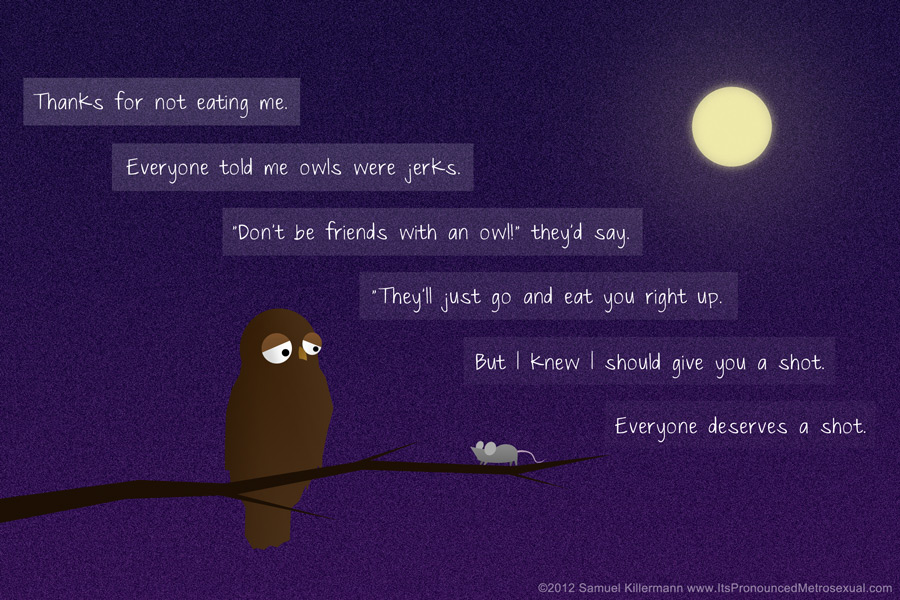Social justice — the idea that everyone in a society, regardless of the identities they embody, can have an equitable shot at success and happiness — is a goal that seems unrealistic for many people. “It’s a pipe dream, Sam,” they say, smugly. “Life isn’t rainbows and butterflies,” they say, adorably.
To achieve social justice we will have to break down a lot of huge barriers that exist on a scale far above the individual, but even the biggest scale change is nothing more than the sum of a whole lot of individual efforts. My goal with this site is to support you in doing just that: making big change on an individual level.
Following are a whole lot of individual efforts you can make today that will be significant steps toward that biggest scale change we need for a socially just tomorrow.
- Read through this entire list, acquaint yourself with the breadth of options before diving in
- Learn about how diversity and intersections of identity work
- Read Peggy McIntosh’s “Unpacking the Invisible Knapsack” of White Privilege
- Read 30+ Examples of Cisgender Privilege
- Read 30+ Examples of Male Privilege
- Read 30+ Examples of Heterosexual Privilege
- Read 30+ Examples of Christian Privilege
- Read 30+ Examples of Middle-to-Upperclass Privilege
- Write an essay listing and addressing all of the societal privilege you have (feel free to email it to me)
- Learn about how gender is much more than male and female
- And learn how sexual orientation works for those non-binary gender folks
- Discuss what your gender means to you with a friend you perceive to have the same gender, and one whose gender is different
- Read how to avoid being a stereotype
- And learn why positive stereotypes aren’t positive
- Write a list of all the stereotypes (positive and negative) you can think of for a social group
- Have a focused conversation with someone who doesn’t share one of your privileged identities about their experience
- Repeat #15 with all of your privileged identities (e.g., White, straight, man or cisgender, middle-to-upper class, non disabled, Christian)
- Practice these 5 best practices of effective social justice work
- Oh, and consider these 10 tips for thickening your skin to handle the emotional drain
- Take a free online college social justice course, like this one from the British Columbia Teachers Federation
- Sign up for mailing lists from social justice publications to get new learning material in your inbox (sidebar on the right for mine)
- Introduce the idea of “social justice” to someone who’s never heard the term
- Teach someone when it is okay to say the word gay
- And explain why “non-straight” isn’t a good alternative to the word “gay”
- Talk to social justice educators about their stories and reasons for doing the work (here’s one of mine)
- Comment on a social justice focused article you read and ask for a clarification of a point you didn’t understand
- Learn how to respond if someone uses non-inclusive (bigoted) language
- Practice different responses to various forms of non-inclusive language with a friend
- Attend a social justice seminar/conference in your area (use Google, or comment below to find one)
- Learn how to explain that bisexuality is real, not just “a step between gay and straight”
- Write an essay analyzing one of your privileged identities, like this one on straightness
- Understand that there is a difference between political correctness and being inclusive
- Ask for feedback from others on your approaches to social justice work
- Implement that feedback in meaningful ways in future endeavors
- Share all of the things you learned from this list with your social groups and networks
- Stop following the golden rule, and follow the platinum rule instead
- Make sure your school, business, org, etc. has gender-inclusive forms
- Use person-centered language, remembering that any aspect of a person is just that: an aspect of a person
- Remember that being an ally or social justice advocate is a full-time gig — there are no breaks or vacations
- Confront a friend or family member when they use non-inclusive language
- Confront a stranger when they use non-inclusive language
- Understand that intentions are less important than outcomes, and hold yourself accountable
- Help others understand the intentions vs. outcomes thing by sharing this handy edugraphic.
- Set a maximum number of hypocritical acts you’ll allow yourself per day, and hold yourself to this
- Lower the number of hypocritical acts you allow yourself by one after a successful month
- Incorporate one of these 5 ways of making the world more trans-friendly into your life
- Use the term “partner” instead of boyfriend or girlfriend
- Support businesses that support social justice
- Sign on to support a cause at TakePart.com, or volunteer to help a local cause; consistency is more helpful than a once in a while big burst of help
- Use your privilege in one area to lift the status of an underprivileged group: donate money, write a blog, organize a rally, start a peer training program
- Build your own world
- Reply below with another concrete way you can work for social justice.


